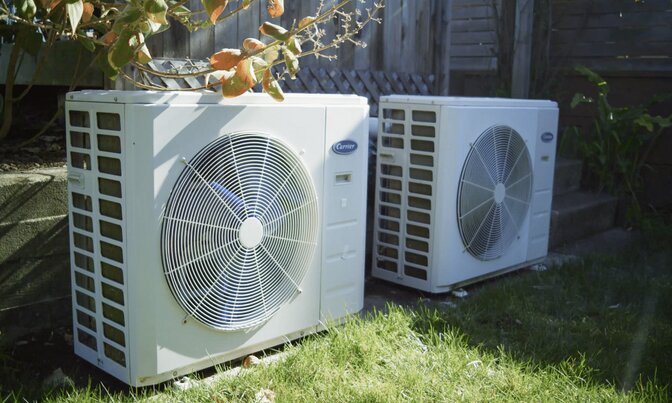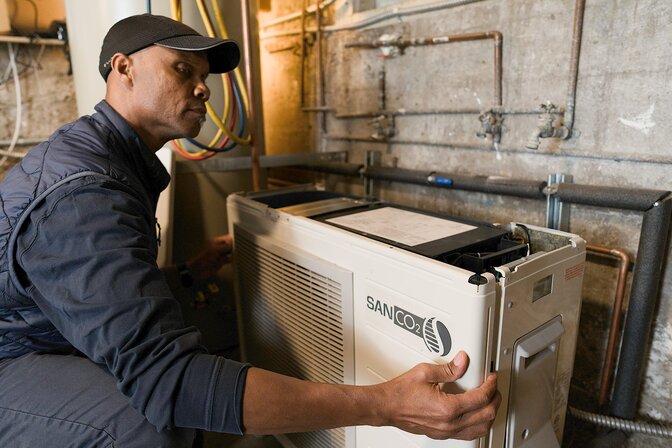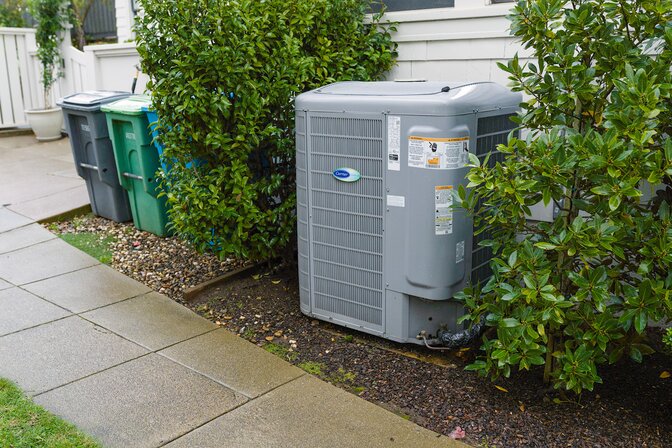Why heat pumps are a smart choice
A heat pump can be one of the best upgrades you make for your home. They provide energy-efficient heating and cooling, lower your energy bills, and improve indoor air quality. Unlike traditional gas furnaces or air conditioners that only provide heating or cooling, heat pumps do both, making them a year-round solution for home comfort in all climates. They’re also far more energy-efficient, using electricity to move heat rather than generating it, which can significantly reduce your carbon footprint and reliance on gas or oil. If you're considering a heat pump for your home, the first step is determining what you need before you start looking for a heat pump contractor. Getting help from an HVAC installer and doing your homework upfront can save you time and money.
A heat pump can keep you consistently comfortable in your home while helping you save on energy bills. But even the best heat pump won’t perform well if it’s not installed correctly. The right heat pump contractor ensures your system runs efficiently and lasts for years. With so many HVAC installers out there, it’s important to know what to look for in a heat pump contractor and how to compare heat pump quotes beyond just price. This guide can help ensure you get a quality installation and the best value for your money.
Learn more about heat pump options and which one is right for your home in this article.
“It's important to know what to look for in a heat pump contractor and how to compare quotes beyond just price.” - Ted Tiffany of The Building Decarbonization Coalition
How to compare heat pump quotes (quick checklist)
- Step 1: Determine your needs and project scope
- Step 2: Find heat pump contractors
- Step 3: Screen contractors
- Step 4: Compare heat pump quotes
- Step 5: Finalize your decision and set expectations
Step 1: Define your home cooling and heating needs and project scope

Before searching for a heat pump contractor, take some time to clarify the scope of your project.
- Are you replacing a gas furnace with a heat pump, or is this part of a broader home electrification plan that includes appliances like a heat pump water heater or an induction stove?
- Will this project require you to reorganize your electrical panel? Larger panel upgrades aren’t always necessary.
“The first step should be to do your research on what you want for your electrification path. This might be different for whole home electrification versus just adding space conditioning.” - Ted Tiffany of The Building Decarbonization Coalition
Understanding the full scope of your needs can help you find the right heat pump contractor, ensure you’re asking the right questions, and maximize incentives.
It’s also important to consider whether you need a ducted heat pump system, which distributes air through existing ductwork, or a ductless mini-split system, which offers flexibility for homes without ducts. Some contractors specialize in one or the other, so knowing what you want can help you narrow down your contractor search.
If your electrical panel is older, you might need to organize and optimize your panel to accommodate your new heat pump system. Check out this article to learn more about how to get the most out of your current panel instead of upgrading to a larger size.
Before you start reaching out to contractors, check whether you qualify for rebates or incentives. The Switch Is On Incentive Finder tool can show you available rebates and tax credits in your area. Knowing what financial assistance you’re eligible for ahead of time is important so you can ask heat pump contractors whether they will assist you with rebate applications.
Step 2: Find heat pump contractors
Not all HVAC contractors are heat pump specialists. Some still prioritize gas system installations and may not have extensive experience with modern high-efficiency heat pumps. When searching for a heat pump contractor, it’s best to use a trusted source like The Switch Is On Contractor Finder tool, which lists professionals experienced in heat pump installations based on your zip code.
A reliable heat pump contractor should have experience with top-quality heat pump brands. These are the brands we recommend. Ask for references from at least two previous heat pump customers to ensure they have a proven track record and that someone unbiased can vouch for them. If a contractor hesitates to provide references or lacks experience with modern heat pumps, it may be a red flag.
It’s also a good idea to check contractor ratings and service areas to ensure they have experience with homes similar to yours (all of this info is available for every contractor in our Contractor Finder tool). Avoid general contractors who primarily focus on unrelated projects, like kitchen remodels, as heat pumps require specialized expertise in energy-efficient heating and cooling.
The Switch Is On Contractor Finder includes vetted pro-electrification contractors who also undergo regular licensing and insurance checks as a requirement to be listed on our site. All you have to do is input your zip code and the type of project you’re looking for, and then you can request a consultation with a few heat pump contractors. Contractor Finder will connect you with contractors you can trust. They will help you:
- Navigate your electrification project
- Identify the best electric appliances and systems specifically for your home
- Maximize your savings with incentives
- Provide expert guidance and resources
Step 3: Screen contractors

Once you have a shortlist of heat pump contractors in your area, take the time to screen them thoroughly. Ask about their experience, licensing, and whether they specialize in heat pump installations rather than general HVAC work.
Some key questions to ask HVAC installers:
- Experience: How many heat pump installations have you completed?
- References: Can you provide at least two references who you have done similar work for?
- Certifications and licensing: What certifications do you have? Is your license and insurance current?
- System design: Will you perform a load calculation on my home (also known as a Manual J calculation—see glossary of HVAC terms below)? Do you offer zoning options for more concise temperature control and improved efficiency?
- Panel capacity: Do you handle electrical upgrades, or will I need to hire a separate electrician?
- Ductwork: How will you assess my home’s ductwork and insulation needs? Do you plan to reuse existing systems like ductwork and refrigerant lines as part of this project?
- Permitting and rebates: Will you apply for permits, or is that my responsibility? Do you assist with rebate applications, and if so, do you charge for that service?
- Process: What is the expected timeline for installation?
- Post-installation support: Do you offer education and support on the new system and thermostat settings?
- Warranty and call-back support: What is the warranty period on the equipment and your work? Who do I call for equipment issues, you or the manufacturer?
It’s very important to ask about their installation process. A good heat pump contractor should be willing to perform a load calculation to determine the correct size of the heat pump for your home. If they dismiss the need for this step, it may indicate they are not following best practices. They should also be properly certified to do HVAC work.
Look for a heat pump contractor with these licenses and certifications:
- A reputable contractor should hold a valid HVAC license in your state.
- Look for NATE (North American Technician Excellence) certification, which indicates advanced training.
- Manufacturer certifications show expertise with specific heat pump brands.
Additionally, if your ductwork is old and leaking, replacing it may be necessary to maximize efficiency. Be sure to get a clear timeline for the project, including how long it will take from permit approval to final inspection.
These are some basic topic areas to cover when screening contractors:
- Experience and expertise
- Equipment sizing and design
- Rebates and incentives
- Installation process
- Post-installation support
A reputable contractor should also offer post-installation support, explain the warranty on parts and labor, and educate you on how to use your new system and thermostat settings. Some heat pump contractors provide ongoing maintenance plans, which can help extend the lifespan of your heat pump.
See this article on heat pump care for other ways to extend the life of your heat pump system.
Step 4: Compare heat pump quotes

After screening several heat pump contractors, the next step is to compare quotes from each contractor. A detailed quote should include the heat pump's brand and model, efficiency ratings, and a clear breakdown of labor and installation costs. The scope of work should also be clearly outlined, including any necessary duct modifications, refrigerant line replacements, or electrical upgrades.
Get quotes from at least three heat pump contractors and consider the following factors as you move forward in the process:
- Price vs. value
- Reputation and credentials
- Equipment quality and long-term savings
- Contractor support and warranty
Be sure to check the payment schedule outlined in the quote, including deposit, progress payments, and final settlement. In California, contractors cannot require more than 10% of the total contract price or $1,000—whichever is lower—as a deposit. To clarify which laws apply to your project, be sure to check the state laws where you live, as they vary. Washington state, for example, has no legal limit to the deposit a contractor can charge. While New York also has no legal limit, the state does require that all payments and deposits be set aside in an escrow account. If a contractor asks for an unreasonably large upfront payment, consider it a red flag.
Also ask heat pump contractors how they handle unexpected costs, such as issues that arise during installation, like asbestos removal or faulty wiring. The contract terms should specify a process for approving change orders and items that exceed the budgeted amounts to prevent surprise expenses.
“It's not legal for a contractor to collect a deposit of more than $1,000 or 10% of the total contract value in the state of California.” - Jeni Rios, Electrification Consultant
Here are some additional details to look for when comparing heat pump quotes:
- Equipment details
- Scope of work
- Labor and installation costs
- Warranty and service plans
- Additional costs
- Contingencies for unforeseen work
Be cautious of contractors who primarily install gas systems or those who can’t provide references. Some companies also suffer from poor internal coordination, where the sales team promises one thing, but the installers do something different. If a contractor’s team seems disorganized or unresponsive, it might be best to look for additional options.
🚩Red flags when hiring a heat pump contractor 🚩
- Tries to sell a gas heating system instead of a heat pump
- Lacks references from past heat pump installs
- Won’t perform a load calculation
- Proposes to do the work without a permit
- Sales team, system designers, and installation technicians not aligned
- Vague or incomplete quote
- Tries to rush you into a decision with high-pressure sales tactics
- Requests a high upfront payment
Step 5: Finalize your decision
Before signing a contract, review all terms carefully. Ensure everything is in writing, including the full scope of work, costs, and warranty details. Confirm who will handle rebate applications and whether the contractor will be responsible for submitting permits and getting final project approvals. Both are often needed before incentive programs will process rebate payments. If you have any remaining questions, schedule a final discussion with the heat pump contractor before making your decision.
Setting clear expectations with your contractor before the project begins can help avoid misunderstandings. Discuss these details:
- Daily cleanup, work hours, and where workers will park.
- If you work from home, ask whether the noise level will be disruptive.
- If you have small children or pets, let the contractor know about any scheduling concerns.
Addressing these details in advance will ensure a smoother installation process and more efficient, comfortable cooling and heating for your home.
“In the scope of work, costs for permits, and incentive program applications should be separate from labor and installation costs—they should be called out as separate items.” – Ted Tiffany of The Building Decarbonization Coalition
Hire your heat pump contractor
Hiring the right heat pump contractor is just as important as choosing the right heat pump. A well-installed heat pump will provide energy-efficient heating and cooling for years to come, while a poor installation can lead to costly inefficiencies and repairs. By taking the time to define your project needs, find a specialized contractor, and carefully compare heat pump quotes, you can ensure a successful transition to clean, efficient electric heating and cooling.
Next steps
Now that you’re ready to find a heat pump contractor for your next project, we can connect you with a pro who’s experienced and skilled in heat pump installations.
Top questions to ask a heat pump contractor
- How many heat pumps have you installed?
- Are you licensed and NATE-certified?
- Will you perform a Manual J load calculation?
- Do you offer zoning or ductwork improvements?
- Can you help with rebate applications and permits?
FAQs: How to hire the right heat pump contractor for your home
Glossary of HVAC terms
Below are some key HVAC-related terms provided by the Air Conditioning Contractors of America (ACCA). Don’t worry – you won’t be tested on them.
- Load calculation: A building’s load calculations consider a variety of issues: property location (Boston’s weather is different than that of Los Angeles), orientation (southwest glass gets much more sun than north glass), construction materials (R-value of insulation, brick or siding, etc.), building size, etc. Heating and cooling needs are expressed in BritishThermal Units per hour or Btu/h. A “block load” looks at the whole building’s requirements as one large room. A “room-by-room” load calculation refines the calculation to determine individual rooms’ or zones’ requirements.
- Ton (of air conditioning): A “ton” of air conditioning refers to capacity in relation to melting one ton of ice in 24 hours. The capacity is measured in British Thermal Units (Btu); 288,000 Btu are required to melt one ton of ice in 24 hours (or 12,000 Btu/hr). A 2-ton air conditioner has a nominal capacity of about 24,000 Btu/h. In air conditioning, a "ton" measures how much cooling power the system has. It comes from how much heat is needed to melt 2,000 pounds (one ton) of ice in a day. One ton of air conditioning equals 12,000 BTUs (British Thermal Units) per hour. So, a 2-ton air conditioner can remove 24,000 BTUs of heat per hour from a space.
- Manufacturer’s performance data: This is information provided by the manufacturer to specify the capacity for a particular model. You may hear cooling terms like 2-ton or 3.5-ton. These are nominal capacities at standard rating points. For heating systems, the Btu/h are expressed by how much heating capacity goes into the furnace (i.e., an 80% efficient, 80,000 Btu/h furnace receives enough fuel to create 64,000 Btu/h of output heat). This is information from the company that makes the air conditioner or heater, showing how much cooling or heating a specific model can provide. For example, air conditioners are labeled as "2-ton" or "3.5-ton" based on their cooling power under normal conditions. For heaters, the power is measured in BTUs per hour (Btu/h), and not all the heat created turns into usable warmth. For example, an 80,000 Btu/h furnace that is 80% efficient actually provides 64,000 Btu/h of heat.
- Equipment selection: Equipment is manufactured to meet standardized performance requirements. Manufacturers publish expanded performance data that details how the equipment performs at actual operating conditions. Applying the manufacturer’s performance data to your home’s load is essential to saving energy with the right unit.
- Efficiency: Performance indicators for cooling are the Seasonal Energy Efficiency Ratio (SEER) and Energy Efficiency Ratio (EER). Heating indicators are Coefficient of Performance (COP) and Heating Seasonal Performance Factor (HSPF). These are determined under laboratory conditions.
- Certified matched system: The Air Conditioning, Heating, and Refrigeration Institute (AHRI) puts heating and cooling equipment through rigorous certification processes to ensure systems deliver the promised performance under certain test conditions.
- Combustion analysis: When fossil fuels are used to heat a home, furnaces, and boilers should be adjusted to ensure that they are efficiently consuming fuel and that they have sufficient oxygen to properly combust the fuel. A combustion analysis test, with a properly calibrated meter, is an optimal approach to verify the combustion rate.
- Vent system: Fossil fuels produce carbon monoxide (CO) when used to heat a home. Your contractor will verify that the vent piping is the correct size and properly installed. A carbon monoxide test is supplemental to ensure that the furnace or boiler is venting properly, exhausting all harmful gases away from the occupants.